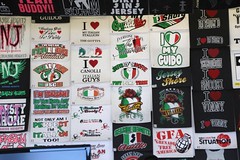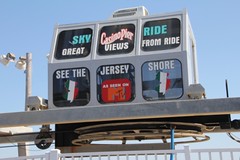Hitting Pause on ‘Gangnam Style’

POP CULTURE SENSATION: Korean pop star PSY performs his hit ‘Gangnam Style’ on NBC’s ‘Today Show’ at Rockefeller Plaza in New York. The video has surpassed 200 million views on YouTube. (Photo: Nancy Kaszerman/Newscom)
Perhaps you’ve been wondering what all the fuss is about “Gangnam Style,” the latest YouTube video-gone-viral with more than 220 million views to date. If you are one of the few remaining inhabitants of the planet who haven’t seen the video, then let me bring you up to speed:
• The rap/song features South Korean pop star Park Jae-Sang, who goes by the name “Psy” (short for “Psycho”), accompanied by a cast of South Korean celebrities who most of us will not recognize, all dancing to a driving, ear-catching techno beat.
• Unless you are fluent in Korean, you can expect to understand none of the words in the video except “sexy lady” (and of course, “Gangnam style”. By the way, “Gangnam” is pronounced Gahng-nahm — not “gang” rhyming with “bang” as I continue to hear many American media types pronounce it.) You can find a translation of the full song all over the Internet; here is one example.
• “Gangnam” refers to the wealthiest, most opulent district in Seoul, South Korea; it’s an area that is only 15 square miles but holds nearly as much of the nation’s GDP as New York state (that’s state, not city) does in the U.S. You can look at this infographic for some more details.)
• No horses were harmed in the making of the video, but they do inspire the dance move that is taking the world by storm.
So is “Gangnam Style” worth watching? I have seen it a few times now, and I admit the tune is catchy and the video visually arresting (albeit occasionally bizarre; Psy breaks down the song scene-by-scene here). I’ve now also seen countless clips of Psy’s appearances on the gamut of American television shows, from Ellen to SNL to the MTV Video Music Awards, each time with Psy doing his signature horse trotting from the song, each time with an exuberant audience laughing and loving every moment.
It’s fun.
Yet with each time I see the spectacle of Psy, I feel like my soul dies just a little bit.
Surely I must be overreacting! As Psy himself says, this is a historic moment for Koreans, who have never had the chance to see one of their own experience this level of pop-culture fame and acceptance here in the U.S. Shouldn’t I, a Korean-American, be thrilled for his success and full of ethnic pride for his popularity? Or at the very least, can’t I just enjoy the song alongside his hundreds of millions of fans and try to master his moves like Britney Spears?
The easy thing to do would be to watch the video, have a few laughs, share it like everyone else is doing, then move on with my life. What’s the harm? But I think about an exhortation that Professor Rosalie de Rosset gave to Moody Bible Institute students recently, and it stops me short:
“Having a philosophy of leisure means that, as a Christian, you have thought theologically and biblically about what you do with the time you call your own, with what you choose as entertainment, what you do when you relax or you may fall into the moral problem of drift, of a ‘group think’ mentality which merely follows a leaderless crowd, falling into triviality but even more the great emptiness that can haunt us as we drift along by chance or by circumstance.”
(From Dr. de Rosset’s chapel talk entitled “Mindful or Mindless: A Theology of Leisure and Technology,” September 12, 2012, Moody Bible Institute.)
I think that it’s the descent into “group think” that has bothered me most about the “Gangnam Style” phenomenon. Most people can only discern that Psy is singing about “sexy ladies” and managing to get a whole slew of them to dance like horses. Few have looked into the song enough to understand that it is actually poking fun at the lifestyle and excesses of über-upscale Gangnam.
I imagine my ambivalence about the video’s popularity might be akin to what I’ve heard some of my African American friends say about certain black rappers or shows on BET — that they are unintentionally propagating old stereotypes in the manner of a modern-day minstrel show. The sad irony is that the more popular “Gangnam Style” has become, the more its actual substance has gotten lost amidst the spectacle. What began as a song that contained an interesting social commentary has become a “minstrel show” for the majority masses.
Moreover, when music becomes popularized, it takes on a cultish quality: people become converted, they evangelize about the songs (made easy these days with all of our “liking” and “sharing” and “tweeting” of media), and the artist is turned into an idol. In his book Listen to This, music critic Alex Ross writes that “audiences have routinely adopted music as a sort of secular religion. … Musicians find themselves, in a strange way, both enshrined and enslaved.”
As I watch Psy move from talk show to talk show, repeating his now familiar shtick of “dress classy, dance cheesy,” as much as there is a part of me that is happy for him and his success (and I admit I feel some of that for him), there is an equal or larger part of me that feels sorry for him. He cannot go anywhere right now without doing the same show, over and over, because that is what the masses desire and require.

A MESSAGE BEHIND THE MADNESS: Those who understand Korean know that ‘Gangnam Style’ is actually poking fun at the lifestyle and excesses of an ultra-wealthy and exclusive district of Seoul, South Korea. But most viewers of the video are likely unaware of the song’s satirical intent.
The masses don’t care if the song has some deeper intent; they don’t want to know what all the foreign-sounding words even mean. They’re content with the novelty of it all (and with the horse dance). Likewise, the media doesn’t care about the opportunity the song gives to open a window — damning though it may be — into South Korean culture. They just use Psy to boost their ratings and then move on. Psy might be having the time of his life, but I wonder if there is any part of him that wishes he could just be free of all the madness.
So the popularity of “Gangnam Style” isn’t just a human-interest story of a K-pop (“Korean-pop”) star unexpectedly making it big. It also gives us clues about the world and culture in which we live. And we can either uncritically laugh alongside Psy’s legion of countless new fans, mimicking him with exuberance, or we can take a moment to ask ourselves if there is any downside to spending a few scant minutes of our lives watching the video, sharing it with our friends, and perpetuating the mass hysteria.
In that same chapel talk to the Moody students, Dr. de Rosset says, “What we do with our leisure can have more effect on us than what we do purposefully. What we do purely for pleasure may have the greatest and most insidious effect on us.” A YouTube video-gone-viral of a Korean pop star may just be a YouTube video-gone-viral of a Korean pop star. Or perhaps it is we who are infected, with an ailment that clouds our ability to even discern anymore what is worth watching and sharing, or what is not even worth watching at all.



